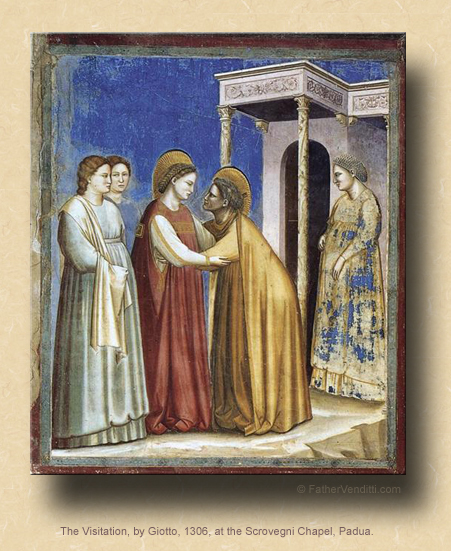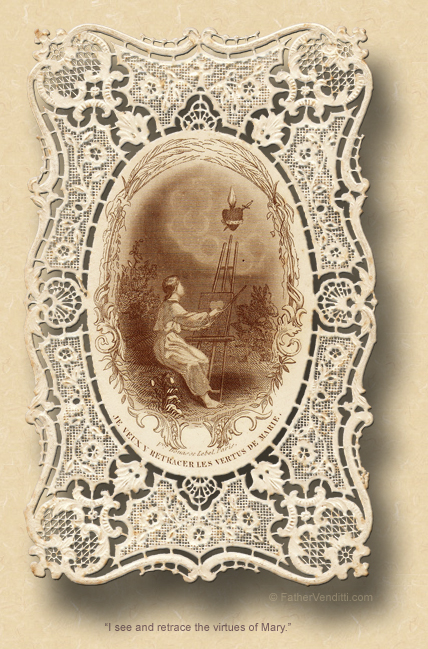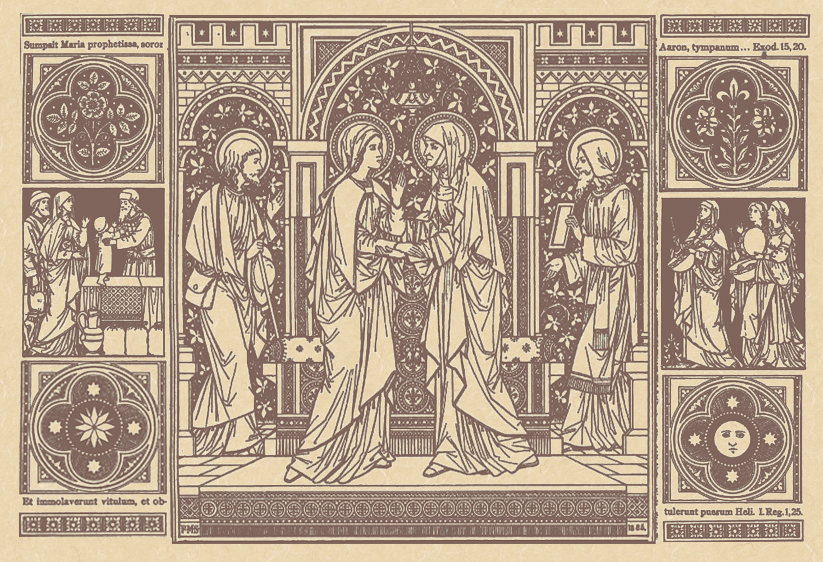We Wouldn't Worry So Much about What Others Think of Us if Only We Realized How Seldom They Do.
The Feast of the Visitation of the Blessed Virgin Mary.
Lessons from the proper, according to the ordinary form of the Roman Rite:
• Zephaniah 3: 14-18; or, Romans 12: 9-16.
• [Responsorial] Isaiah 12: 2-6.
• Luke 1: 39-56.
The Second Class Feast of Our Lady, Virgin & Queen; and, the Commemoration of Saint Petronilla, Virgin.*
Lessons from the proper, according to the extraordinary form of the Roman Rite:
• Ecclesiasticus 24: 5, 7, 9-11, 30-31.
• [The Gradual is omitted.]
• Luke 1: 26-33.
|
If a Mass for the commemoration is taken, lessons from the common:**
• I Corinthians 7: 25-34.
• Psalm 44: 12, 11.
• Matthew 25: 1-13.
|
A Postfestive Day of the Ascension; the Feast of the Holy Apostle Hermes; and, the Feast of the Holy Martyr Hermeas.
Lessons from the pentecostarion, according to the Ruthenian recension of the Byzantine Rite:
• Acts 21: 26-32.
• John 16: 2-13.
FatherVenditti.com
|
9:12 AM 5/31/2017 —
[Mary] is the gate through which all God's graces pass. She seasons our good actions, imparting an enhanced value to them. She makes our offering even more acceptable to God. Finally, she grants us the title of possessors of the divine Heart. It might even be said that she induces God to be our servant. This is because God has never been able to resist the supplication of a humble heart.***
 That's from a sermon by the Curé d'Ars. The odd thing is, our Blessed Mother had little reason to be humble if we view this virtue the way most of us do: after all, She was conceived without the original fault that causes temptation and vice in the rest of us. And we have these thoughts because we tend to view this virtue in a purely negative way: it involves a denial of one's pride, a tempering of one's ambition, and extinction of our egoism and vanity; and, our Lady did not experience any of these temptations because it's our fallen nature which is the cause of all temptation, a fallen nature that our Blessed Mother does not share with us. That's from a sermon by the Curé d'Ars. The odd thing is, our Blessed Mother had little reason to be humble if we view this virtue the way most of us do: after all, She was conceived without the original fault that causes temptation and vice in the rest of us. And we have these thoughts because we tend to view this virtue in a purely negative way: it involves a denial of one's pride, a tempering of one's ambition, and extinction of our egoism and vanity; and, our Lady did not experience any of these temptations because it's our fallen nature which is the cause of all temptation, a fallen nature that our Blessed Mother does not share with us.
But when you look at the word “humility,” it derives from the Latin word humus, which means earth, soil or dirt. Humility is really a recognition of our human origin in the dust of which Adam was made. The virtue of humility consists in the living out of a realistic appraisal of our comparative insignificance as creatures who are totally dependent on God. The great spiritual writer of the Dominicans, Father Reginald Garrigou-Lagrange, wrote:
Humility, by inclining us toward the earth, recognizes our littleness, our poverty, and in its way glorifies the majesty of God … The interior soul experiences a holy joy in annihilating itself, as it were, before God to recognize practically that He alone is great and that, in comparison with His, all human greatness is empty of truth like a lie.†
So, humility is really nothing more than a recognition of reality. It's like I told someone once, who said he had become concerned that he was becoming increasingly obsessed with his public reputation—which is, of course, a symptom of the sin of pride—we wouldn't worry so much about what others think of us if only we realized how seldom they do.
Look at the scene of our Lady's Magnificat at the Visitation: as soon as the Archangel tells Her that She is to be the Mother of God, She immediately declares Herself the Lord's Handmaid. Devoid of the sin of pride, She clearly recognizes that She, like the rest of us, comes from the earth, created by God out of nothing, caused to exist moment by moment because God wills Her to exist. The more She is elevated by God, the more She is moved to be humble before Him; which is why, right after receiving the praise of her cousin, Elizabeth, who recognized Her as the Mother of God right away, She put herself at Her cousin's service, staying with her three months in order to serve her.
Our Blessed Lord once said, “Everyone who exalts himself shall be humbled, and he that humbles himself shall be exalted” (Luke 14: 11 Knox), but that's a loaded sentence; because, if we interpret it in a purely pedestrian and negative way—that anyone who puts on airs will get his comeuppance—we've missed the point.  Our Lord doesn't waste his words giving practical, home-spun wisdom as one would get from Norman Vincent Peale or “Chicken Soup for the Soul.” The person who humbles himself will be exalted because the person who is thus exalted will, if he is truly conscious of his creature-hood—conscious of the fact that he was made from the dust of the earth, and that he wouldn't exist at all if God were not continually willing his existence moment by moment—would know instinctively that being raised up by God is a call to recognize the truth: the truth of Who God is, of who he is, and his place before God. Our Lord doesn't waste his words giving practical, home-spun wisdom as one would get from Norman Vincent Peale or “Chicken Soup for the Soul.” The person who humbles himself will be exalted because the person who is thus exalted will, if he is truly conscious of his creature-hood—conscious of the fact that he was made from the dust of the earth, and that he wouldn't exist at all if God were not continually willing his existence moment by moment—would know instinctively that being raised up by God is a call to recognize the truth: the truth of Who God is, of who he is, and his place before God.
That's what our Lady knew instinctively, but we don't have to be free from sin like She was to know that about ourselves. It's just a matter of taking ourselves down a peg. When we examine our consciences in preparation for confession, we often don't realize that our frustration with habitual sin is really an exercise in the sin of pride. “Father, I keep struggling with this; I don't know what to do?” What do you mean you don't know what to do? You know very well what to do: acknowledge you are nothing, place it in the hands of our Lord, and then get on with your day. The idea that there's some sort of secret spiritual trick that we've missed out on, and if the priest would only tell us what it is our habitual sin would just go away, is all rooted in the fact that we think we're more important than we are; that just because we want to be holy and free from sin, that desire alone merits God just waving his magic hands and freeing us from the concupiscence of a fallen nature. And when we think that way, how are we any different from the Pharisee in the Temple? “I thank thee, God, that I am not like the rest of men, who steal and cheat and commit adultery, or like this publican here” (Luke 18: 11 Knox). Our Lord says that the publican was the one who went home that day justified, not because he was any better than the Pharisee—because he wasn't—but because he knew who he was; he recognized the truth about himself, and was able to live with it.
Let us, on this Feast of the Visitation, turn to the Mother of God, and ask Her to implore Her Son to grant us the Grace of self-knowledge.

* In the extraordinary form, the Visitation is observed on July 2nd; thus, the Second Class Feast of Our Lady, Virgin and Queen, introduced by Pope Pius XII on October 11th, 1954, to be celebrated today, is not concomitant with the Visitation in the ordinary form, as the Gospel is that of the Annunciation. In the ordinary form, it has been reduced in rank to a memorial and transfered to August 22nd under the title the Queenship of the Blessed Virgin Mary.
A disciple of St. Peter, Aurelia Petronilla is honored principally in France. She died in AD 60.
** On this day, a Mass for the commemoration would only be taken for the most important of reasons, such as if the saint were the patroness of the parish; otherwise, the commemoration is made by an additional Collect, Secret and Postcommunion, as such a commemoration would not ordinarily displace a Feast of the Second Class.
*** St. John Vianney, Sermon on the 10th Sunday after Pentecost.
† R. Garrigou-Lagrange, The Three Ways of the Interior Life, II, p. 118.
|

